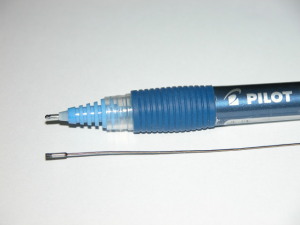
Medigus, Ltd.'s new medical
camera might be the smallest
in the world
Only 1.2 millimeters in diameter, about the size of the ball at the tip of a ballpoint pen, the latest camera from Medigus, Ltd., an Israeli medical firm, is the smallest in the world, according to its manufacturers.
Tiny and inexpensive, the camera will initially be used for medical products such as disposable endoscopes, according to Medigus. The camera's CMOS sensors, made from semiconductors that convert light into electrical signals, and are found in many digital cameras, will be produced by another Israeli company, Tower Semiconductor, Ltd., a foundry specializing in the technology.
Elazar Sonneschein, PhD, president of Medigus, a nine-year-old company based in Omer, expects the camera to launch in the first quarter of next year, and to go for a recession-friendly cost of $30 or $40.



Ad Statistics
Times Displayed: 316
Times Visited: 2 Keep biomedical devices ready to go, so care teams can be ready to care for patients. GE HealthCare’s ReadySee™ helps overcome frustrations due to lack of network and device visibility, manual troubleshooting, and downtime.
Although its price is cheap, its development was not: Dr. Sonneschein tells DOTmed News that researching the technology was challenging, and risky. "There are difficulties in how to wire a cable to such a miniature sensor," he says. "We had to develop new technologies to connect [them]."
Dr. Sonneschein's team of engineers also had to reach a delicate compromise: packing on extra electronics so the camera could deliver as much pixel power as possible, while keeping its ultra-small size. In fact, because of the financial risk involved, the expense of the project's development had to be partly covered by grants from the Israeli government, Dr. Sonneschein says.
Medigus believes the camera represents a major advance of the CMOS platform. It can resolve over 50,000 pixels, and comes equipped with a zoom feature that can magnify the image up to four times. "Most of the surgeons shown the image were shocked," Dr. Sonneschein says, referring to early trials of the product, "to see such a good image by such a small sensor."
"From a diagnostic viewpoint," says Dr. Jonathan Erber, a gastroenterologist affiliated with Beth-Israel Medical Center who specializes in endoscopic technologies, "miniaturization is good." The camera could be a "tremendous breakthrough," he adds, for "diagnostic-alone imaging. You could pass something through, very small, and perhaps it wouldn't require any sedation. Someone could just swallow this device on a very small tether."
However, Dr. Erber was quick to point out that more innovations are needed before tiny endoscopes replace standard ones, which are usually about the size of a pinky finger, Dr. Erber says. Most endoscopes carry other tools that allow doctors to control the scope's movement, take samples and staunch bleeding -- all tools that take up space. "It's like building a tiny car," he says, "you still have to put people in the car."
Nonetheless, Dr. Erber believes that low-cost, disposable endoscopes show promise in that doctors won't have to worry about re-processing endoscopes to sterilize them, which can be expensive.
While Dr. Sonneschein declines to specify which companies in the United States are looking to use the camera, he does say, "We are in a very good relationship with most of the players in the market."
For the moment, Dr. Sonneschein plans to market the device only to medical companies, but he acknowledges it might have other uses. "Because the real estate it consumes is so small, it can be incorporated in many devices," he says. Dr. Sonneschein believes it could be helpful for industrial applications, such as inspecting turbines or engines.
Find out more at www.medigus.com.

